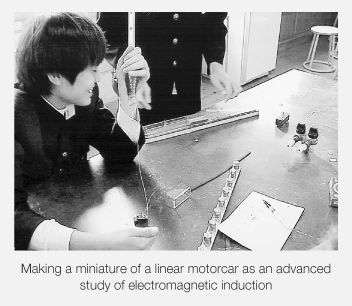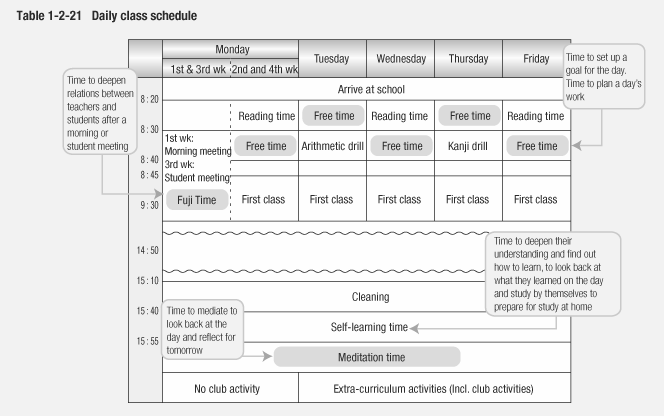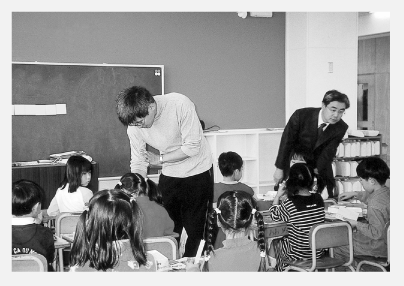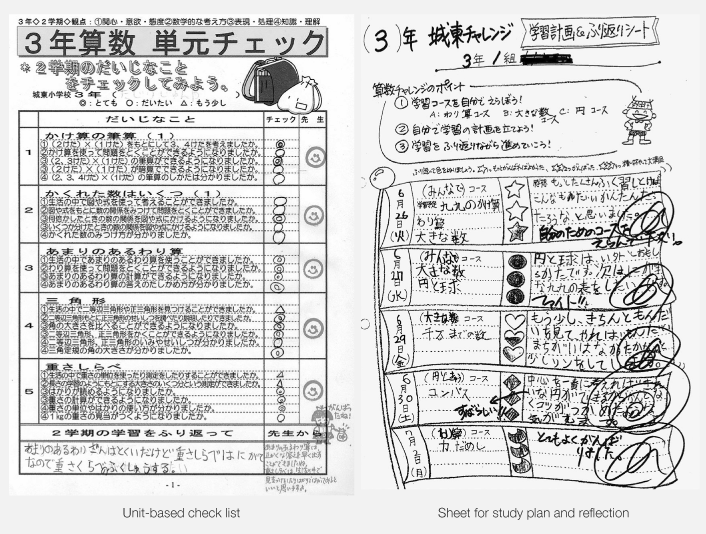| Home > Policy > White Paper, Notice, Announcement > White Paper > Japanese Government Policies in Education, Culture, Sports, Science and Technology 2002 >Chapter2 Section4.2 | ||
Schools nationwide have been making various active efforts towards the attainment of "Academic Ability". Some examples are: (1) introduction of an elective course to attract their interest, (2) flexible class scheduling for effective learning time, and (3) expansion of vigorous efforts for improvement of teaching method, such as achievement-based teaching and a small-group class.
It expects that many more schools will start such activities nationwide and improve their teaching methods considering their own regional and school characteristics.
| Cases: Inventive approach and selective subjects |
[Ena-City Ena-Nishi Junior High School: Gifu Prefecture]
Point to the realization of teaching for maximum expanse of each student's ability, the school prepared a wide range of selective subjects. In particular, students can select English classes depending on their particular level of achievement; either a class for basics or a class for the advanced level.
< Selective subjects for third graders >
English A: GROW UP COURSE
A catch-up course to relearn the contents for the first and second graders and acquire reliable basic knowledge through repetitive practices
English B: CHALLENGE COURSE
A course to help students develop abilities required to take the STEP Test (Eiken) (e.g. listening comprehension)
English C: BRUSH-UP COURSE
An advanced course to further develop acquired skills, through the making of closed caption for movies, conversation, and story reading
[Gifu-City Kano Junior High School: Gifu Prefecture]
In selective subjects of science, students can work on their own choice of research or study based on their achievements in compulsory subjects depending on their own interest.
< Selective subjects for the third graders >
Recognize Nature Course
- Objectives
To help students improve their understanding of basic knowledge and develop observational and experimental abilities, as well as the ability and attitude to watch natural phenomena from a scientific point of view.

- Learning activities
Primary (First half): Common basic learning
Secondary (Latter half): Pursuit for each one's research
| Cases: Flexible learning schedule |
[Semine-Cho Semine Junior High School: Miyagi Prefecture]
To achieve the goal of the new Course of Study, the school is scheduling classes flexibly and encouraging study before regular curriculum.
< Basic class schedule for seven terms per year >
To further improve selective subjects and Period for Integrated Study, the school rearranged the timetable so that particular subjects could be focused on as necessary.

< Improvement of daily class schedule >

| Cases: Unique and inventive teaching system and approach |
[Sapporo-City Yamahana Minami Elementary School]
The school improves various unique teaching approaches mainly under a concept of "Joint Grade Teacher".
< What is a joint grade teacher? >
Under this basic concept of teaching, teachers who supervise all classes in a grade work together to provide careful eyes on individual students to form better relations with them, and to find out and develop their strengths.
< Guidance approach >
Thus, various teaching approaches are being applied depending on the children's actual situation and learning content.

[Haibara-Cho Haibara Junior High School: Shizuoka Prefecture]
The school gives proficiency-dependent teaching in respect of students' desires and in consultation with teachers.
< Example: 2nd grade mathematics >
| Cases: Solid understanding of basic knowledge through specific learning activities and under specific goals |
[Kumamoto-City Joto Elementary School: Kumamoto Prefecture]
To ensure that students develop basic knowledge and skills as stipulated in the Course of Study, the school developed a self-check sheet for students to self evaluate how well they understand classes well.
< Examples (Arithmetic for the 3rd graders) >

| Back To Top | MEXT HOME |